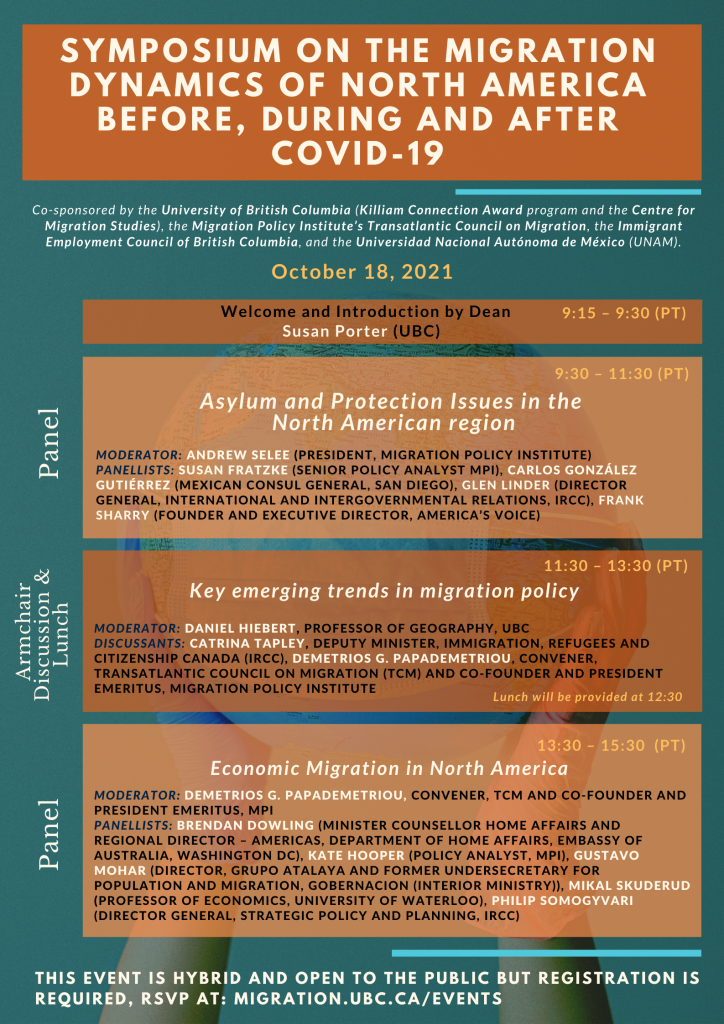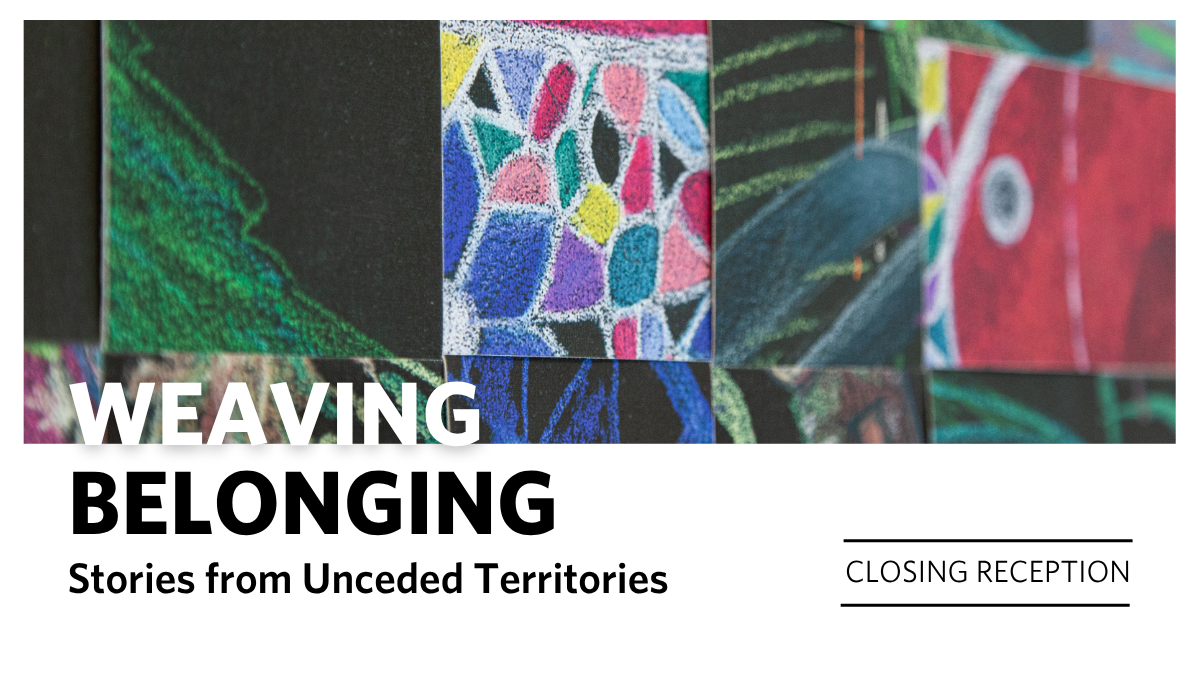Symposium on the Migration Dynamics of North America Before, During, and After Covid-19
Co-sponsored by the University of British Columbia (Killiam Connection Award program and the Centre for Migration Studies), the Migration Policy Institute’s Transatlantic Council on Migration, the Immigrant Employment Council of British Columbia, and the Universidad Nacional Autónoma de México (UNAM).
October 18, 20219:00am – 3:30pm— Pacific Time (PT)Location: UBC Robson Square TheatreIn-person attendance will be limited to comply with BC Public Health Regulations.To register for in-person or online attendance, please fill out the form below.


Context and Background
Migration has profoundly affected and continues to shape the social, cultural, demographic, and economic dynamics of Canada, the United States, and Central America—especially the “Northern Triangle” countries of Guatemala, El Salvador and Honduras. And its influence will only grow stronger in the years ahead. In the meantime, however, the manner in which would-be immigrants from the region (and beyond) attempt to enter Mexico, the U.S., and periodically, Canada, is fuelling political crises in these countries, affects adversely the capacity and quality of protection regimes in the region, and complicates relationships and interactions within the North American region. In that sense, the migration facts on the ground and policy responses to them in the North American region embody and reflect many of the global dynamics—and challenges—of migration today.
Today’s regional migration story is occurring simultaneously with sweeping demographic, economic and social changes both across Mexico and Central America, but also the United States and, perhaps to a lesser degree, Canada. These changes are altering the dynamics of the region’s migration system in ways that force a re-examination of long-established political axioms about the effectiveness of unilateral actions, and even sovereign prerogatives, in controlling unauthorized migration, each nation’s responsibility for protection, and most fundamentally, how to achieve and ensure the goals of safe, legal, and orderly migration that have become the mantra of government officials, analysts, and activists alike. And as if these challenges are not complex enough, they are reinforced by the complications of the Covid-19 pandemic and the political forces that threaten to get out of control as publics lose confidence in their governments’ ability, and often will, to manage migration—and borders—in ways that both adhere to the rule of law and pursue pragmatic and cooperative solutions.
Among the questions the symposium will address are the following:
- Who are these newest migrants and why did they choose to migrate now?
- What are the responses in targeted destination countries and how consistent are they with international obligations with regard to protection?
- What happens to these newest migrants and the families and communities they leave behind?
- How are they received and incorporated in the communities in which they become part?
- How can governments all along the migration arc best manage the flows?
- How can governments in the region, working closely with the private sector and civil society, give definition and voice to a proactive regional vision of migration management that focuses on citizen security, human-capital development, and opportunity?
- What will be the response to and likely impact of such migration on the post-pandemic economic recovery and how will it affect and reshape the political context that surrounds migration within the region?
- How can countries in the region build and maintain robust legal immigration systems that meet international obligations toward those seeking protection, treat newcomers fairly and humanely, maintain commitments to family (re)unification, meet economic and labour market needs, and promote international competitiveness.
AGENDA
9:15 – 9:30 Welcome and Introduction by Dean Susan Porter (UBC)
9:30 – 11:30 Panel: Asylum and Protection Issues in the North American region
Moderator: Andrew Selee, President, Migration Policy Institute
Panellists: Susan Fratzke (Senior Policy Analyst MPI), Carlos González Gutiérrez (Mexican Consul General, San Diego), Glen Linder (Director General, International and Intergovernmental Relations, IRCC), Frank Sharry (Founder and Executive Director, America’s Voice),
There have been important developments in protection-related migration in North America in recent years. These include: repeated large-scale movements of unaccompanied minors and “family units” during the last decade and, more recently, of “caravans” of migrants gathering in Central America and travelling northward through Mexico toward the United States; large numbers of asylum seekers reluctantly hosted by, and in many cases becoming long-term residents of, Mexico; and an unusual scale of “irregular” border crossings from and through the United States to Canada during the waning years of this century’s second decade . All three countries responded by reinforcing their borders and augmenting their capacity to stem the flows and adjudicate asylum claims more capably. Policies, however, had to quickly respond to the much larger issue of the COVID-19 pandemic and, in the case of the United States, changing political administrations. As borders reopen, the number of people seeking asylum regardless of merit will likely return to the scale seen in 2018 and 19, and could potentially increase, given the degree of economic disruption in Central and South America—as well as Mexico.
The following are among the questions this panel will consider:
- How will Mexico, the US, and Canada respond to these forces?
- How will policy balance humanitarian concerns, national interests and priorities, and sovereign obligations in the near future in the North American context?
- Will these responses be specific to each country of the region or more coordinated—and if the latter, what might be the most promising roadmap?
11:30 – 12:30 Armchair Discussion
What key trends can we expect to see in Canadian migration policy during the post-Covid recovery phase, and how do these compare with developments in other major migration destination countries?
Discussants:
Moderated by Daniel Hiebert (Professor of Geography, University of British Columbia)
- Catrina Tapley, Deputy Minister, Immigration, Refugees and Citizenship Canada (IRCC)
- Demetrios G. Papademetriou, Convener, Transatlantic Council on Migration (TCM) and Co-founder and President Emeritus, Migration Policy Institute
12:30 – 1:30 Lunch
13:30 – 15:30 Panel: Economic Migration in North America
Moderated by Demetrios G. Papademetriou, Convener, TCM and Co-founder and President Emeritus, MPI
Panellists: Brendan Dowling (Minister Counsellor Home Affairs and Regional Director – Americas, Department of Home Affairs, Embassy of Australia, Washington DC), Kate Hooper (Policy Analyst, MPI), Gustavo Mohar (Director, Grupo Atalaya and former Undersecretary for Population and Migration, Gobernacion (Interior Ministry)), Mikal Skuderud (Professor of Economics, University of Waterloo), Philip Somogyvari (Director General, Strategic Policy and Planning, IRCC),
The demographic challenges and economic/labour market realities at play prior to the pandemic are quickly reasserting themselves as the coronavirus retreats and economic recovery begins to take hold—however unevenly. Demographic deficits in Canada go back several decades while demographic shortfalls in the United States, most evident in recent U.S. Census Bureau reports, are increasingly becoming part of policy conversations at all levels of government and society. And Mexico has completed its demographic transition and has gradually moved toward below replacement fertility. (The estimated Total Fertility Rates (TFRs) of the three countries in 2021 are: Canada, 1.50; US, 1.78; and Mexico, 2.07. This compares with the 2018 rates of 2.87, 2.04, and 2.46 for Guatemala, El Salvador, and Honduras, respectively.) These facts make international migration an even more relevant policy topic in the USMCA Free Trade countries.
Understandably, Canada has relied the most heavily on immigration to propel demographic and economic growth and respond to severe demographic and worker deficits in most of its provinces. But the intersection between migration and demographic imbalances is also becoming a more central issue in the US, and in the near future, that will also be true for Mexico—especially given the manner in which migration beyond its southern-most region has grown in that country (mostly through unauthorized and de facto “refugee” cases). Considering the political volatility of the migration issue in parts of the region, it is crucial that governments and civil society in all three countries come to a common understanding about how to think and talk about, and organize, their migration systems so as to respond to their labor market and demographic needs, especially below the federal level. Moreover, a serious conversation must be had about how much and where (language training, education and vocational training, social services and assistance, etc.) they should invest in the integration of newcomers. In the past, large-scale and continuous migration from Mexico to the US has filled large portions of the labour market abandoned by American workers or suffering from locational mismatches between workers and jobs. But for more than a decade, net migration between the two countries has been negligible and for even longer than that, an “ethnic succession” has become the norm, with unauthorized workers from the Northern triangle countries replacing Mexicans, initially in the most difficult and least well-paid jobs in many sectors.
The following are among the questions this panel will consider:
- How have migration patterns changed during the economic disruption associated with COVID-19, and how are they likely to shift over the next few years?
- What steps will Mexico likely take as it becomes a more important migration destination?
- To what extent will the Biden Administration chart a new course on economic migration and what might that course look like?
- How will Canada reconfigure its economic migration and immigration programs as the large baby-boom generation moves more fully into retirement?
- And most importantly, to what extent will the emerging policies of the three USMCA countries be developed in isolation, rather than through coordinated efforts that take advantage of the many economic, human capital, and demographic opportunities the region offers?
